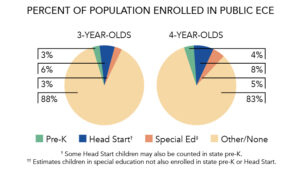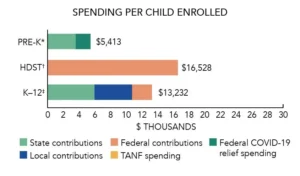The Countdown Begins - AZ Students Need a Permanent Fix to the School Spending Limit
Arizona voters approved into law a limit on what public schools can spend in a year based on the needs in 1980. If schools exceed the limit in a school year, as they did last year and again this year, the law allows the legislature to provide an “expenditure override” to allow districts to spend funds that have already been budgeted, with a two-thirds vote in both the House and Senate. An expenditure override does not increase taxes and is independent of the legislature’s budget decisions during the year.
The spending limit is antiquated and based on what school needs were like in 1980. That is evident by the fact that Arizona is hitting the spending limit this year despite Arizona school funding being the lowest in the nation. Without the expenditure override, schools would be forced to make extreme cuts before the end of this school year. It would be an economic disaster for the Arizona public school system, especially since the state funding per pupil ratio is among the lowest in the nation. Arizona’s public schools are already experiencing a teacher shortage and struggling with additional costs caused by the pandemic.
Today’s school state funding should not be restricted to budgets created over 40 years ago.
The Arizona legislature must:
- Send a referral to the ballot to permanently address the issue.
- Continue to pass a resolution to override the limit for each school year until voters address the issue.
The Problem with the Limit. Arizona’s Aggregate Expenditure Limit is outdated. It is based on education spending in the 1980s – before personal computers, the emphasis on STEM education, concerns about school safety, teacher shortages, and increased spending for special education students. Today, it threatens Arizona’s ability to make the investments needed to increase its per-student funding ranking above 48th in the nation.
Overriding the Limit. Arizona’s constitution allows school districts only one option to avoid budget cuts – a one-time override that must be passed, not by voters, but by the state legislature, and not by a simple majority but by two-thirds of both chambers. Should this override approval not occur by the March 1 deadline, districts will be directed to reduce their budgets to keep within the limit and submit a revised budget in April.
To make a permanent change to the limit, either the legislature would need to refer the issue to the voters or signatures would need to be collected to place the issue on the ballot at a future general election.
Options for a Permanent Fix to the Spending Limit. The only option to avoid districts having to cut their budgets in the middle of the school year is for the legislature to pass a one-time override. But Arizona needs a permanent fix to the current expenditure limit. Here are some options for a permanent fix:
- Reset the Base Year. If Arizona retains the Aggregate Spending Limit calculation, it needs to be based on what today’s public schools pay for – computers and technology, student safety, increased pay for teachers, and all other district staff. This option requires voter approval to amend the state constitution.
- Use the Weighted Student Count. Instead of using a student count that reflects just enrollment, a weighted student count would take into consideration the higher costs of providing education to students with special needs, small school districts, grade level, and English language learners.
- Expand the List of What is Exempt from the Limit. The school spending limit should not include spending linked to school or student characteristics, such as increases in the number of special education students, students with disabilities, or English language learners, or the mix between elementary and secondary students.
Eliminate the Expenditure Limit Altogether. The K-12 aggregate spending limit was adopted at a time when major changes were being made to how the state’s public schools were to be funded. Concerns existed that these changes might result in significant tax increases. Today, we know that school spending is controlled in several ways. It increases to the per-student base-level spending formula are restricted to inflation or 2 percent, whichever is less, and are set each year by the legislature. Beginning in fiscal year 2025, these inflationary increases to base-level funding can be suspended or even reversed if inflation and employment growth do not exceed limits passed by voters or if K-12 education’s portion of the state general fund budget reaches 49 percent or more. Eliminating the expenditure limit does not mean eliminating all spending limits.
Download the AEL one-pager PDF here


